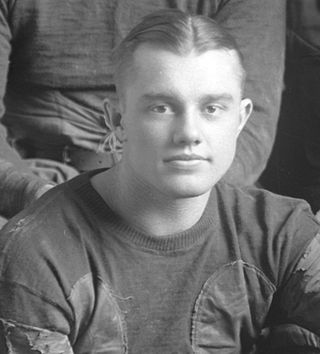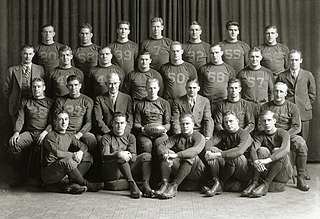Related Research Articles

The Little Brown Jug is a trophy contested between the Michigan Wolverines football team of the University of Michigan and the Minnesota Golden Gophers football team of the University of Minnesota. The Little Brown Jug is an earthenware jug that serves as a trophy awarded to the winner of the game. It is one of the oldest and most played rivalries in American college football, dating to 1892. The Little Brown Jug is the most regularly exchanged rivalry trophy in college football, the oldest trophy game in FBS college football, and the second oldest rivalry trophy overall, next to the 1899 Territorial Cup, contested between Arizona and Arizona State.
The 1903 Minnesota Golden Gophers football team represented the University of Minnesota in the 1903 college football season. In their fourth year under head coach Henry L. Williams, the Golden Gophers compiled a 14–0–1 record, shut out 13 of their 15 opponents, and outscored all opponents by a combined total of 656 to 12. The team finished the season in a tie with Michigan for the Western Conference co-championship. When Minnesota and Michigan met, the teams played to a tie in a game that gave rise the Little Brown Jug trophy.

The 1933 Michigan Wolverines football team represented the University of Michigan in the 1933 Big Ten Conference football season. Under fifth-year head coach Harry Kipke, Michigan compiled an undefeated 7–0–1 record, outscored opponents 131 to 18, extended the team's unbeaten streak to 22 games, and won both the Big Ten Conference and national football championships. The defense shut out five of its eight opponents and gave up an average of only 2.2 points per game. In December 1933, Michigan was awarded the Knute K. Rockne Trophy as the No. 1 team in the country under the Dickinson System. By winning a share of its fourth consecutive Big Ten football championships, the 1933 Wolverines also tied a record set by Fielding H. Yost's "Point-a-Minute" teams from 1901 to 1904.

The 1903 Michigan Wolverines football team represented the University of Michigan in the 1903 college football season. The team's head football coach was Fielding H. Yost. The Wolverines played their home games at Regents Field. The 1903 team compiled a record of 11–0–1 and outscored opponents 565 to 6. The only points allowed came on a touchdown in a 6–6 tie with Minnesota. All eleven wins were shutouts. The 1903 Michigan team was the third of Yost's "Point-a-Minute" teams and has been recognized retrospectively as a co-national champion by the National Championship Foundation.

William Edward Daley was an All-American fullback who played for the University of Minnesota Golden Gophers from 1940 to 1942 and for the University of Michigan Wolverines in 1943. The Gophers were national champions in his freshman and sophomore years.

Irwin Charles "Utz" Uteritz was an American athlete and coach. He played American football and baseball for the University of Michigan from 1921 to 1923. At 140 pounds, he was one of the lightest quarterbacks ever to start for a major college program. Despite his size, Michigan football coach Fielding H. Yost called him "the best field general I ever had." Uteritz led Michigan to back-to-back undefeated seasons and a national championship in 1923. He also played three years of baseball for Michigan at second base and shortstop, hit above .300 and was elected as captain of the 1923 baseball team. Uteritz later served as a football and baseball coach at Northwestern University (1924–1925), the University of Wisconsin (1925–1935), the University of California (1935–1947), and Washington University in St. Louis (1947–1963).

The 1984 Michigan Wolverines football team was an American football team that represented the University of Michigan in the 1984 Big Ten Conference football season. In their 16th season under head coach Bo Schembechler, the Wolverines compiled a 6–6 record and outscored opponents by a total of 214 to 200. It was the only team in Michigan's 21 seasons under coach Schembechler that did not finish its season with a winning record.

The 1930 Michigan Wolverines football team represented the University of Michigan in the 1930 college football season. The head coach was former Michigan star, 31-year-old Harry Kipke, in his second year in the position.
The 1941 Michigan Wolverines football team represented the University of Michigan in the 1941 Big Ten Conference football season. Under fourth-year head coach Fritz Crisler, Michigan compiled a record of 6–1–1, outscored opponents 147 to 41 and was ranked No. 5 in the final AP Poll. The team played three ranked opponents, defeating No. 5 Northwestern (14–7), playing to a tie with No. 14 Ohio State (20–20), and losing by a 7–0 score to the 1941 Minnesota team that won the 1941 national championship. With a strong, veteran line, the Wolverines also shut out four of their eight opponents: Pittsburgh (40–0); Columbia (28–0); Illinois (20–0); and Iowa (6–0).

The 1963 Michigan Wolverines football team was an American football team that represented the University of Michigan in the 1963 Big Ten Conference football season. In its fifth year under head coach Bump Elliott, Michigan compiled a 3–4–2 record, tied for fifth place in the Big Ten, and outscored opponents by a total of 131 to 127. The highlight of the season was an upset victory over No. 2 Illinois led by Dick Butkus, the only loss suffered by the 1963 Illinois team.

The 1960 Michigan Wolverines football team was an American football team that represented the University of Michigan in the 1960 Big Ten Conference football season. In its second year under head coach Bump Elliott, Michigan compiled a 5–4 record, finished in fifth place in the Big Ten, and outscored opponents by a combined total of 133 to 84.

The 1959 Michigan Wolverines football team was an American football team that represented the University of Michigan in the 1959 Big Ten Conference football season. In its first year under head coach Bump Elliott, Michigan compiled a 4–5 record, finished in seventh place in the Big Ten, and was outscored by a combined total of 161 to 122.
The 1937 Michigan Wolverines football team was an American football team that represented the University of Michigan in the 1937 Big Ten Conference football season. In their ninth season under head coach Harry Kipke, the Wolverines compiled a 4–4 record and tied for fourth place in the Big Ten. Kipke was fired after the season, having compiled a 46–26–4 record in nine years as Michigan's head coach.
The 1935 Michigan Wolverines football team represented the University of Michigan in the 1935 college football season. In their seventh season under head coach Harry Kipke, the Wolverines compiled a 4–4 record, and were outscored by opponents by a combined total of 131 to 68. The team had a 4–1 record after five games, but was shut out in its final three games. Michigan's 40–0 loss to 1935 consensus national champion Minnesota in the annual Little Brown Jug game was the worst defeat suffered by a Michigan Wolverines football team since 1892.
The 1934 Michigan Wolverines football team was an American football team that represented the University of Michigan in the 1934 Big Ten Conference football season. In their sixth season under head coach Harry Kipke, the Wolverines compiled a 1–7 record and finished last in the Big Ten. Prior to the 1934 season, the Wolverines had compiled a 22-game undefeated streak dating back to October 1931.

The 1909 Michigan Wolverines football team represented the University of Michigan in the 1909 college football season. The team's head coach was Fielding H. Yost in his ninth year at Michigan. The Wolverines compiled a record of 6–1, outscored opponents 116 to 34, and held six of seven opponents to six points or less.

Clare Jack Wheeler was an American football player. He played in the backfield for the University of Michigan from 1928 to 1930 and was the Most Valuable Player on the 1930 Michigan Wolverines football team.

The promotion of Bump Elliott to head coach in 1959 defined a historical era of the University of Michigan Wolverines football through 1968 when he resigned after that season. Michigan was a member of the Big Ten Conference and played its home games at Michigan Stadium during the Elliott years. During the 10 years in which Elliott served as head football coach, Michigan compiled a record of 51–42–2 (.547) and claimed one Big Ten championship, one Rose Bowl victory, and two Chicago Tribune Silver Football awards for the most valuable player in the Big Ten. However, the Wolverines finished higher than third place in the Big Ten only twice.
The 1903 Western Conference football season was the eighth season of college football played by the member schools of the Western Conference and was a part of the 1903 college football season.
Paul A. Adams was an American football player and coach. He spent his entire coaching career at Deerfield High School in Deerfield, Illinois. In 1991, he was elected to the Illinois State High School Football Hall of Fame, and in 1992, the Waukegan Sports Hall of Fame. Upon his retirement, the Chicago Tribune described him as "legendary" and "king of the north suburbs".
References
- ↑ Sakamoto, Bob (August 24, 1992). "Deerfield's Adams Will Leave Legacy Behind". Chicago Tribune. p. 11.
- ↑ "Minnesota's Miracle". sportsillustrated.cnn.com/vault. October 31, 1977. Archived from the original on January 2, 2013. Retrieved May 12, 2010.
- ↑ Jauss, Bill (February 4, 1990). "Chicago: Sudden Death For Many Teams -- Windy City A Graveyard For Pro Clubs". Seattle Times.
- ↑ "startribune.com". Sid Hartman column. Archived from the original on June 7, 2011.